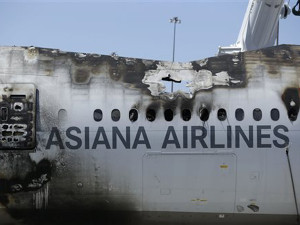 In the wake of the Asiana Airlines crash at the San Francisco International Airport, there has been puzzlement over how the accident happened, particularly as there were four pilots on board, one or more of whom surely would have pointed out that the plane was coming in way too slowly for a safe landing. The main pilot was not experienced with the Boeing 777 but the other pilots were. This has raised questions about how the pilots interacted with one another and led to speculation that there must have been some communication failure that contributed to the crash. Because the pilots were all Korean, several commentators (including a piece in the National Geographic Daily News) have brought up the analysis by Malcolm Gladwell of Korean pilots in his 2008 book, Outliers. Gladwell also talked about Korean pilots in a CNN interview (video embedded below). Gladwell points to the poor safety record of Korean airlines in the 1990’s, which he relates to the Korean respect for authority and hierarchy. In a culture like Korea, with a large power distance, it is less likely that a subordinate (such as a co-pilot) will point out possible errors or problems, as that would be disrespectful.
In the wake of the Asiana Airlines crash at the San Francisco International Airport, there has been puzzlement over how the accident happened, particularly as there were four pilots on board, one or more of whom surely would have pointed out that the plane was coming in way too slowly for a safe landing. The main pilot was not experienced with the Boeing 777 but the other pilots were. This has raised questions about how the pilots interacted with one another and led to speculation that there must have been some communication failure that contributed to the crash. Because the pilots were all Korean, several commentators (including a piece in the National Geographic Daily News) have brought up the analysis by Malcolm Gladwell of Korean pilots in his 2008 book, Outliers. Gladwell also talked about Korean pilots in a CNN interview (video embedded below). Gladwell points to the poor safety record of Korean airlines in the 1990’s, which he relates to the Korean respect for authority and hierarchy. In a culture like Korea, with a large power distance, it is less likely that a subordinate (such as a co-pilot) will point out possible errors or problems, as that would be disrespectful.
There is no doubt that respect for superiors and elders is a traditional aspect of Korean life, still in evidence today. I recently spent time at a Seoul National University and was struck by the deferential attitude of the Korean students, which was markedly different from my experiences with Chinese students in Shanghai and Beijing. However, does this mean that all Koreans in all contexts will behave in a way consistent with this trait of their national culture? Are there no other forces at work that can affect individual behavior? In fact, we all have identities that are complex combinations of influences that come from a variety of sources, including individual experiences, family life, social media, group membership. In the case of pilots, it would seem to me that the work environment and the extensive training involved would necessarily influence cockpit behavior in significant ways.
In the CNN interview, Gladwell mentions that respect for authority is built into the Korean language, with its rich use of politeness forms, and that having the pilots speak English (which Gladwell characterizes as a “non-hierarchical” language) has led to a behavioral change. That’s an interesting socio-linguistic theory but I’m not sold on its validity.